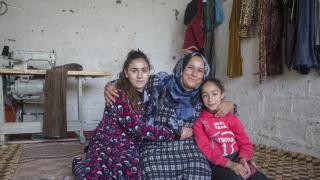A Negative Ripple Effect: How the war in Ukraine is crippling fragile communities
Here in Yei, we are an entire continent away – 4,865 km/3,023 miles to be exact – from Ukraine.
Yet, despite this distance, women here are already sharing stories about how a faraway war is having a significant and negative impact on their day-to-day lives.
The challenges posed by the rising cost of fuel and oil, food price shocks and an increase in the flow of refugees are familiar to most people across the world. But the impact on women in the communities where we work is devastating. As much as the violence and upheaval is affecting Ukrainians, the spillover effects of the Russian invasion are crippling fragile and conflict-affected communities well beyond Ukraine’s borders.
Yei is a small town near South Sudan’s border with Uganda and the Democratic Republic of the Congo (DRC), and the local communities are uniquely vulnerable to global shocks due to high levels of poverty and instability as a result of ongoing conflict.
I work with Women for Women International on our programmes here to support the most marginalised women to rebuild their lives. They are often already on the brink of poverty when they join our programme and/or are unable to access government benefits due to their refugee status.
Prices have skyrocketed recently following the inflation of the dollar against the South Sudanese Pound.
The price of wheat flour has risen by 50% and just five litres of oil now costs at least 5,500 South Sudanese Pounds - the equivalent of £10 GBP more than it cost before the war in Ukraine began.
Women for Women International’s programmes include vocational training and a module on savings and financial literacy so that women can earn and save their own income to improve their resilience in the face of emergencies like this. However, women in our programmes tell us the prolonged elevated costs of daily necessities and the increased transportation costs are making it hard for them to stretch their savings and to sustain their small businesses. This puts immense pressure on women’s already scant resources, leading them to miss or even drop out of our classes to work doubly hard. For example, women are cultivating their land to farm more food, just to try and put food on the table.
I fear this is just the start of yet another crisis here in South Sudan, on top of existing security threats to women where they risk being raped or killed.
I reached out to my colleagues in Iraq, the DRC and Nigeria to find out if they’d had similar experiences, and it is clear that they share my concerns. They all reported that the varied effects of the war in Ukraine are negatively impacting on the women who participate in our programmes and their communities, as well as our operational capacity to support them.
For example, just as in South Sudan, the price of bread alone has increased by 33%, 100% and 200% in Iraq, DRC and Nigeria respectively. In the DRC, where 79% of the country’s population lives below the poverty line (earning less than 3,883 Congolese francs or $1.90 USD per day), the cost for a trip on public transport has skyrocketed from 500 Congolese francs to 3,000 Congolese francs due to the rising fuel costs – nearly an entire day’s worth of earnings. And in Nigeria, many women have abandoned local transport altogether due to its rising cost, limiting the number of activities they can take part in from day-to-day in a very practical sense and making it difficult for women to sustain a small business as profit margins diminish and opportunity costs rise.
My colleague, Bukola Onyishi, the Country Director of Women for Women International - Nigeria, tells me:
Already we are working with the most marginalised in our society. Unfortunately, the present situation is pushing more people into this bracket of most marginalised.
It is critical that the international community provide support and attention to Ukrainians affected by the war, with whom we share a hope for peace. However, for other countries – like South Sudan – where famine and poverty loom large due to food insecurity, rising fuel prices and the gaps in food imports from Ukraine and Russia, and where floods and an escalation in conflict are expected imminently, support and attention are just as urgent.
Governments and the international community must provide the increased support necessary to meet all needs, rather than shifting resources and attention from one crisis to another.
At Women for Women International, we often talk about creating a positive ‘ripple effect’ - that when women can use their power, they reinvest it in their families, their communities, and their countries to make the whole world better — for everyone. Sadly, as survivors of war anywhere in the world know all too well, the logic of the ‘ripple effect’ can also have a downside when the first drop in the water is from a bomb.
Women for Women International's work in South Sudan is generously supported by players of People's Postcode Lottery.
Keep Reading
As millions in Ukraine are forced to flee their homes, we must not forget about people in countries such as Afghanistan, South Sudan and Iraq who are also dealing with the effects of the war. Read about how the war in Ukraine is contributing to global hunger and leaving millions on the brink of starvation.
5 Facts About What Refugee Women Face
subtitle:
The amount of forcibly displaced people has reached a staggering number—over 114 million according to UNHCR—and the number only continues to increase. This World Refugee Day, learn about the state of refugees today.




